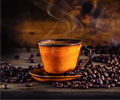A new home testing kit to test the caffeine content of beverages such as tea, coffee and soda may be commercially available.
A new home testing kit to test the caffeine content of beverages such as tea, coffee and soda may be commercially available. You can now clear your suspicion about the decaf label that claims reduced or nil caffeine content. The home based kit, produced by researchers at Washington University School of Medicine, is based on a dipstick analysis. The results of the present study have been published in the journal, Analytical Chemistry, a publication of the American Chemical Society.
‘We envisioned that a simple method to measure caffeine, even in hot beverages, such as coffee, would be of value to individuals and institutions wanting to verify the absence of caffeine,’ says study leader Jack H. Ladenson, Ph.D., a chemist at the university. ‘This will greatly assist individuals who wish to avoid caffeine.’Ladenson hopes to develop a simple caffeine test in which test strips that are treated with a specific antibody will react by changing color in the presence of caffeine.
The new test will be designed to be qualitative only: It allows a person to quickly determine whether caffeine is present, but does not indicate the exact amount or concentration of caffeine. In preliminary tests using coffee and cola, an experimental version of the test effectively distinguished caffeinated versions of these products from their decaf counterparts, Ladenson says.
The researcher adds that he does not know when the test will be available to consumers or at what price. Further refinements are ongoing, he says.
Many consumers are increasingly trying to avoid caffeine due to unwanted health effects, including insomnia and irritability. Several studies have linked an increase in caffeine consumption with a higher risk of miscarriage among pregnant women. For years, the U.S. Food and Drug Administration has specifically advised pregnant women to avoid or limit their intake of caffeine.
But the caffeine content of foods and beverages can be difficult for consumers to determine. Products do not always indicate whether they contain caffeine, and the caffeine content of similar food products can vary widely depending on the manufacturer. Even drinks that are labeled ‘decaf’ can contain detectable amounts of caffeine, experts say.
Advertisement
To develop the new immunoassay test, Ladenson and his associates obtained an unusual antibody — derived from the blood of llamas — that is resistant to high temperatures due to its unusually stable structure. They obtained the antibodies by repeatedly injecting the animals with caffeine to illicit an immune response to the drug. The researchers then cloned the caffeine-specific antibody and combined it with other chemicals to facilitate caffeine detection.
Advertisement
The antibodies worked equally well in both hot and cold beverages and did not appear to show any false readings caused by structures that are similar to caffeine, Ladenson says. He has filed patents related to the research.











